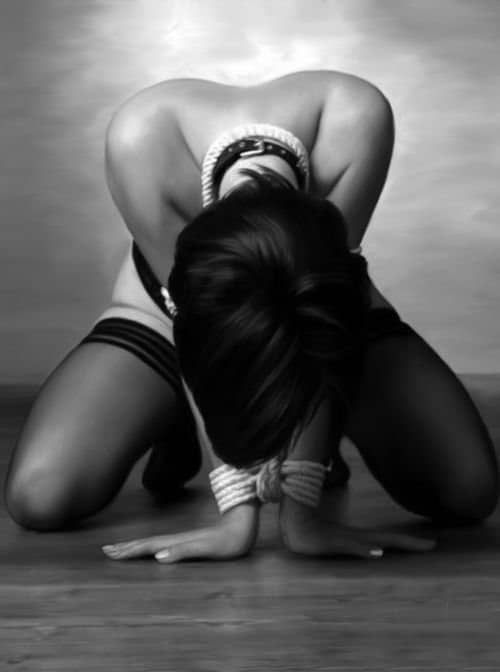What is Drop?
During the course of a scene our bodies and our minds go through a series of changes, physiologically and well as psychologically. The excitement from participating actively in kinks and fetishes initiates a release of endorphins, adrenaline and several other hormones. Breathing increases and becomes shallow, the pulse rate increases, and the body temperature starts to rise, making you feel hot and sweaty. When a scene ends, the decline in intensity and decrease in chemicals that feed our feelings of excitement and joy can cause a void created by those highs. It is possible to
experience low energy levels, lack of motivation, mixed emotions, confusion, feelings of regret and an overall general feeling of
sadness or depression-like symptoms.
Depending on the type of play and intensity, drop can occur directly
after a scene, or it can occur over the next one or two days. If and
when drop occurs it is different for everyone, and is dependent on
a number of variables like: body chemistry, hormones, chemical
dumps, type of play, intensity, duration, physical, psychological and
emotional reactions.
Drop can vary in intensity and severity and can last for a couple of
hours or for several days. In the case of extended scenes where heat
and energy have been expended, drop will likely happen quite quickly,
often as the body cools resulting in chills and sometimes even going
into shock. Some scenes involve longer periods of recovery due to
physical exhaustion, bruising, or abrasions and can take longer to
experience drop. Scenes with emotional stresses added like edge
play can show drop later as feelings and activities are processed and
reconciled.
Sub Drop &Dom(me) Drop
Dominants and submissives, as well as Tops and bottoms will
experience drop differently and it will likely be different each time.
The reason is that the chemicals and hormones breakdown at different
rates and the levels are dependent on the scene. Every scene is
different, the intensity, physical impact, emotions and head spaces
will all influence altering the chemicals and hormones, the physical
and psychological effects of drop each and every time.
sub drop
More commonly discussed, sub drop is more prevalent. This may be because of the increased vulnerability and dependence on another to provide direction through the scene, and to provide a level of care ensuring their safety and well-being. As the intensity of the scene fades, so too can the feeling of security, and assurance. As the body relaxes and the adrenaline subsides, it is common to feel cold and as the endorphins dissipate, to feel weak. Physical and mental strain can lead to drop that if not replenished, can last for hours or days on end.
Dom(me) drop
Being responsible for the outcome of a scene and the potential follow
on care of the submissive requires consistent focus and attention. Whether
the scene is physically demanding or creative and engaging, a Dominant
must maintain focus to ensure that they are aware of their surroundings,
and must be in tune with the submissive’s communication and body
language to play safely. It is only after a scene has ended and the submissive has been cared for that the focus ends. It is common to feel alone in that moment, and question the outcome of the scene. Drop occurs as the focus returns to themselves.

Drop affects everyone differently. Some will
notice it more as a physical reaction while
others may only notice the emotional impact.
Chemistry Behind Drop
When a scene has ended, the body slows down the production
of euphoric chemicals. The rate at which chemical production
increases and decreases impacts the length and intensity of drop.
Endorphins
Considered the “feel good” chemical, endorphins are released into the body’s system in bursts, eventually blocking the nerve cells from sending out pain signals. Endorphins can remain in the system for an extended period of time, but as the body works to replenish its supply, levels will drop below the baseline before stabilizing contributing to a feeling of drop.
Adrenaline and Cortisol
Adrenaline is known as the “fight or flight” chemical. In an initial response
to stress, adrenaline is released adding to a feeling of hyper-awareness and
excitement. Adrenaline also suppresses the effect of endorphins, which can
delay feelings of euphoria until it wears off. In conjunction with adrenaline,
the body also releases cortisol. Cortisol is responsible for increasing energy
by dumping glucose into our system. Together, adrenaline and cortisol increase heart rate and elevate blood pressure.
Oxytocin
Feelings of pleasure and happiness are the product of oxytocin. Often
called the “love hormone”, oxytocin is produced in response to both
mental and physical “loving” activities, including caressing, sex, and
orgasms. Oxytocin levels do not taper off as quickly as other homeone
levels which can create a desire to bond as a scene ends. This can further
increase the feelings of drop, or can be utilized as a tool to help prevent
drop.
Dopamine and Prolactin
Dopamine communicates feelings of reward to the brain. Sex and orgasms can result in a flood of dopamine in the brain – which then leads the body to counteract with the release of prolactin. This re-balancing between dopamine and prolactin is important for stabilizing emotions. Inhibiting
Identifying and Treating Drop
You may never have experienced drop, or you may not have realized
what you were feeling at the time. Below are some indicators to
watch out for and suggestions for dealing with drop.
Signs of drop
- General fatigue, stiffness, full body aches
- Lack of energy
- Regret for participating in kinky acts
- Conflicting emotions
- Low self esteem
- Feelings of guilt and remorse
- Generalized negativity
- Lack of social outreach
- Disinterest, even in things you enjoy, including sex
Potential dangers of drop
- Failure to recognize injury
- Failure to seek medical attention or remedies
- Headaches, nausea, dizziness
- Lack of sleep or exhaustion even after sleeping
- Loss of appetite or binge eating
- Anxiety and depression
- Inflicting self harm
- Dehydration and malnutrition
Reducing & treating drop
- Approach play more gradually start to finish
- Stretch beforehand and have a shower before or after
- Journal / write down feelings
- Adjust your routine to be more active
- Go outside and get some fresh air and sunlight
- Have a kink buddy / friends to talk to
Contributors: Researched, written by Mistress Michelle and published by Umlindi.
These educational topics wouldn’t be possible without the hard work and dedication from our Dom(me)sLife contributors – Thank you MM
